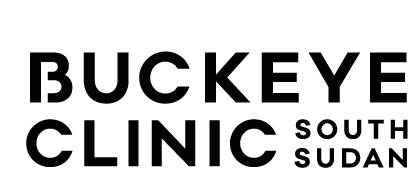About the Clinic
Winter 2007-08 Jok and Bol return to their home village
The only health services in the village in 2008
Jok and Bol returned to their village of Piol for the first time in December 2007. It was a bittersweet reunion with their families, who they had not seen in twenty years. Seeing their mothers, meeting new siblings, and being with aging grandparents was exceptionally gratifying. However, they also learned details of family members who had not survived the destruction of their village. The living conditions in the village deeply concerned them. There were no buildings left after the bombing, only a few family tukals (huts) had been re-built. What had been a densely populated area was now long, empty, grassy fields. Families had very little food and there were no schools. Very few in the village could read or write, and only one person in the village had a job. The only health care was provided by a young man who had a second grade education in English. He had a chair and a card table and a small box of malaria medication, aspirin, and cough syrup which was provided by UNICEF.
They returned to Columbus determined to help their family members. They concluded that additional medical services was the most pressing need of the village and brought together a group of friends to help. A steering committee was formed and began developing plans for a health clinic for the village. Scioto Ridge United Methodist Church adopted the clinic as a mission project. This gave the clinic non-profit organization status (501(c) (3)) and allowed contributions to be tax deductible. Fundraising began and plans for an assessment trip to Southern Sudan were underway.
2010 assessment trip
While on the assessment trip, Steve Walker and Bol Aweng wrote a blog documenting the journey. Read more
In February 2010, Bol Aweng and Steve Walker, a steering committee member, traveled to Southern Sudan to re-assess the needs in the village and seek support from the Ministry of Health (MOH). They met with MOH officials in Juba the federal capitol, and Bor, the Jonglei state capitol. They also met with the local Twic East County Commissioner and the Local Episcopal Bishop. All acknowledged the need for additional medical services in the Piol area. They said that many people are beginning to move back to the area now that the area is more secure and the Nile River no longer floods the area. A new port is being built on the Nile River which will also bring more development and people to the area. A functional health facility is needed because the nearest one is over 35 miles, and a two-day walk from Piol.
Steve and Bol “listened under a tree” to over thirty chiefs, elders, and villagers as they all identified medical services, particularly maternal and child health care, as the greatest need. Mothers and babies are dying during childbirth. Many children are dying before age five of preventable diseases. In May 2009, CARE International built a small medical clinic in the area. The chief reported that it was rarely open and is basically non-functional. The government has not provided salaries for staff and had rarely supplied the clinic with medicine. He said he would like to have a functional clinic with staff and available medicine and vaccines. Other elders said that an additional building is needed to provide maternal and child health care services. A satellite phone for emergency communication is needed, along with transportation to distant hospitals was also needed. Bol and Steve returned to Columbus even more determined to help provide more medical services to the Piol area.
A suitcase stuffed with supplies was ready for the 6,581-mile trek from Port Columbus to the war-ravaged village of Piol in Sudan. On the journey of many stops, the baggage racked up fees of $250 for excess weight—a reminder of the impracticalities of executing good intentions in a faraway land.
In an age of abundance and prosperity, distribution remains an impediment to addressing the poverty of places such as Piol. This is the burden for Bol Aweng and Steve Walker, who took the overstuffed suitcase. They were on a three-week mission to determine the viability of building a functioning health clinic in Piol. It will not be easy. Black cotton soil dries out hard as rock after the rainy season from April through October. When the rain stops, big cracks in the ground open. There are no paved roads to Piol. Simply getting medicine and supplies there will be a logistical logjam.
For Aweng, the mission is personal. His mother and father and dozens of family members live in Piol and his desire to change the harsh inequities between his life and theirs in a driving impulse. In 1987, Aweng fled for his life, along with thousands of other young children, during Sudan’s bloody civil war. Only 6 years old, he walked more the 1,500 miles in search of safety, eventually creating a new life and earning a bachelor’s degree from Ohio State University.
Befriended by Walker, Aweng, along with his cousin, Jok Dau—a constant companion during their years of displacement as refugees—talked for years about doing something for Piol. In late 2009, the arduous work of doing the seemingly impossible began in earnest. Walker’s church, Scioto Ridge United Methodist Church, adopted the Piol Clinic as a mission project. Donations began pouring in: $17,000 in just a few months, a start toward the $300,000 goal.
In Piol, Walker and Aweng listened to a procession of needs from 30 villagers. Aweng’s mother, Awan, pleaded, “When babies are born, everyone is concerned they might die in the first two years.” Her concerns are not misplaced: In southern Sudan, acute malnutrition is the fate of 32 percent of the children under 5. And one in 10 children dies at birth. Women in Piol deliver babies inside shelters made of sorghum stalks covered with a piece of plastic. Tere are no physicians or nurses. Midwives with little formal training assist.
The trip brought to light a revelation: a little building, recently constructed, was sitting empty. And so the vision is changing. Maybe there’s no need to build a new building. Perhaps it’s better to put a dent in the dismal infant survival rates by training midwives and providing prenatal vitamins.
“We have a lot to figure out,” Walker says. But he remains undeterred. “If we don’t do it, it won’t get done,” he says. “And we can get it done.”



